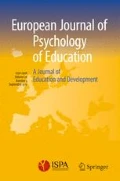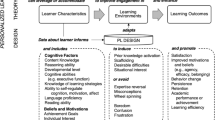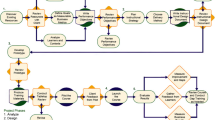Abstract
This paper reports an experimental field study aimed at examining whether a process-oriented form of instruction (combining program planning and interactive teaching) which produced outstanding results when implemented by a tutor/researcher (see Volet, 1991) could be used successfully by regular university tutors given detailed guidelines but minimal training. A second aim of the study was to establish the respective contribution of the two sub-components of the instructional package. The results of the study were inconclusive and raise a number of conceptual, methodological and practical issues. As in the initial study, experimental students were more satisfied with their learning and for those who had the choice, more inclined to undertake further studies in computing but the intervention did not affect students’ achievement. The results of the study are discussed in relation to the earlier work, and suggestions are made for bridging the gap between educational research and educational practice in higher education.
Similar content being viewed by others
References
Adelson, B. (1981). Problem solving and the development of abstract categories in programming languages.Memory and Cognition, 9, 422–433.
Bayman, P., & Mayer, R.E. (1988). Using conceptual models to teach BASIC computer programming.Journal of Educational Psychology, 80, 291–298.
Bielaczyc, K., Brown, A.L., & Pirolli, P. (1994). Collaborative explanations and Metacognition: Identifying successful learning activities in the acquisition of cognitive skills. University of California, Berkeley Report No. CSM-8.
Brooks, R.E. (1980). Studying programmer behavior experimentally: The problems of proper methodology.Communications of the ACM, 23, 207–213.
Brown, A.L., & Palincsar, A.S. (1989). Guided cooperative learning and individual knowledge acquisition. In L.B. Resnick (Ed.),Knowing, Learning and Instruction: Essays in Honor of Robert Glaser (pp. 393–451). Hillsdale, New Jersey: Erlbaum.
Brown, A.L., Bransford, J.D., Ferrara, R.A., & Campione, J.C. (1983). Learning, remembering and understanding. In J.H. Flavell & E.M. Markman (Eds.),Carmichael’s Manual of Child Psychology: Cognitive Development (Vol. 1, pp. 77–166). New York: Wiley.
Dalbey, J., & Linn, M.C. (1985). The demands and requirements of computer programming. A review of the literature.Journal of Educational Computing Research, 1, 253–274.
De Corte, E., Verschaffel, L., & Schrooten, H. (1992). Cognitive effects of learning to program in Logo: A one-year study with sixth graders. In E. De Corte, M. Linn, H. Mandl & L. Verschaffel (Eds.),Computer-based Learning Environments and Problem-solving (pp. 207–228): Berlin: Springer.
de Jong, F. (1993).The complementarity of constructivist and self-regulation instructional approaches. Paper presented at the 5th Conference of the European Association for Research on Learning and Instruction, Aix-en-Provence, France, September.
Kurland, D.M., Pea, R.D., Clement, C., & Mawby, R. (1986) A study of the development of programming ability and thinking skills in high school students.Journal of Educational Computing Research, 2, 429–458.
Linn, M.C., & Clancy, M.J. (1992). Can experts’ explanations help students develop program design skills?International Journal of Man0Machine Studies, 36., 511–551.
Linn, M.C., & Clancy, M.J. (1992). The case for case studies in programming problems.Communications of the ACM, 35, 121–132.
Linn, M.C., Sloane, K., & Clancy, M. (1987). Ideal and actual outcomes from precollege Pascal instruction.Journal of Research in Science Teaching, 24, 467–490.
Lonka, K. (1993).Activating instruction: How to foster study and thinking skills. Paper presented at the 5th Conference of the European Association for Research on Learning and Instruction, Aix-en-Provence, France, September.
McGill, T., & Volet, S.E. (1995). An investigation of the relationship between algorithm quality and program quality.SIGCSE Bulletin, 27, 44–48.
Miles, C. (1988). Cognitive strategies: Implications for college practice. In C.E. Weinstein, E.T. Goetz, & P.A. Alexander (Eds.),Learning and Study Strategies: Issues in Assessment, Instruction and Evaluation (pp. 333–347). San Diego: Academic Press.
Palinscar, A.S., & Brown, A. (1984). Reciprocal teaching of comprehension — fostering and comprehension — monitoring activities.Cognition and Instruction, 1, 117–175.
Palincsar, A.M., Ransom, K., & Derber, S. (1989). Collaborative Research and Development of Reciprocal Teaching.Educational Leadership, Dec. 88/Jan. 89, 37–40.
Paris, S.G., & Byrnes, J.P. (1989). The constructivist approach to self-regulation of learning in the classroom. In B.J. Zimmerman & D.H. Schunk (Eds.),Self-regulated Learning and Academic Achievement (pp. 169–200). New York: Springer.
Schwartz, S., Perkins, D.N., Estey, G., Kruidenier, J., & Simmons, R. (1989). A “metacourse” for Basic: Assessing a new model for enhancing instruction.Journal of Educational Computing Research, 5, 263–297.
Simons, P.R., & Vermunt, J.D.H.M. (1986). Self-regulation in knowledge acquisition: A selection of Dutch research. In G. Beukhof & R.J. Simons (Eds.),German and Dutch research on learning and instruction: General topics and self-regulation in knowledge acquisition (pp. 101–135). Den Haag, The Netherlands: SVO/OTG.
Veenman, M.V.J., Elshout, J.J., & Busato (1991). Metacognitive mediation in learning with Computer Based Simulations.Memo nr. 120, VF-project Knowledge Acquisition in Formal Domains, 1–16.
Vermunt, J.D.H.M. (1993, September).Process-oriented instruction in thinking strategies. Paper presented at the 5th Conference of the European Association for Research on Learning and Instruction, Aix-en-Provence, France.
Vermunt, J.D.H.M. (1994). Design principles of process-oriented instruction. In F.P.C.M. de Jong & B.H.A.M. van Hout-Wolters (Eds.),Process-oriented instruction and learning from text (pp. 15–26). Amsterdam: VU University Press.
Volet, S.E. (1991). Modelling and coaching of relevant metacognitive strategies for enhancing university students’ learning.Learning and Instruction, 1, 319–336.
Volet, S.E., & Chalmers, D. (1992). Investigation of qualitative differences in university students’ learning goals based on an unfolding model of stage development.British Journal of Educational Psychology, 62, 17–34.
Volet, S.E., & Styles, I.M. (1992). Predictors of study management and performance on a first-year computer course: The significance of students’ study goals and perceptions.Journal of Educational Computing Research, 8, 423–449.
Volet, S.E., & Lund, C.P. (1994). Metacognitive instruction in introductory computer programming: A better explanatory construct for performance than traditional factors.Journal of Educational Computing Research, 10, 297–328.
Vygotsky, L.S. (1978).Mind in Society: The Development of Higher Psychological Processes. (M. Cole, V. John-Steiner, S. Scribner, & E. Souberman, Eds. and Trans.). Cambridge, MA: Harvard University Press.
Author information
Authors and Affiliations
Additional information
This research was supported by a grant from Murdoch University.
Rights and permissions
About this article
Cite this article
Volet, S., McGill, T. & Pears, H. Implementing process-based instruction in regular university teaching: Conceptual, methodological and practical issues. Eur J Psychol Educ 10, 385–400 (1995). https://doi.org/10.1007/BF03172928
Received:
Issue Date:
DOI: https://doi.org/10.1007/BF03172928




